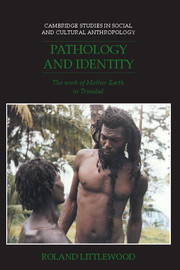Book contents
- Frontmatter
- Contents
- List of illustrations
- Preface
- Acknowledgements
- A note on idiom
- 1 The coming of the Earth People
- 2 A certain degree of instability
- 3 Madness, vice and tabanka: popular knowledge of psychopathology in Trinidad
- 4 Mother Earth and the psychiatrists
- 5 Putting Out The Life
- 6 Your ancestor is you: Africa in a new world
- 7 Nature and the millennium
- 8 Incest: the naked earth
- 9 The Beginning Of The End: everyday life in the valley
- 10 Genesis of meaning, limits of mimesis
- APPENDICES
- Glossary
- Notes
- List of references
- Index
- Cambridge Studies in Social and Cultural Anthropology
2 - A certain degree of instability
Published online by Cambridge University Press: 11 March 2010
- Frontmatter
- Contents
- List of illustrations
- Preface
- Acknowledgements
- A note on idiom
- 1 The coming of the Earth People
- 2 A certain degree of instability
- 3 Madness, vice and tabanka: popular knowledge of psychopathology in Trinidad
- 4 Mother Earth and the psychiatrists
- 5 Putting Out The Life
- 6 Your ancestor is you: Africa in a new world
- 7 Nature and the millennium
- 8 Incest: the naked earth
- 9 The Beginning Of The End: everyday life in the valley
- 10 Genesis of meaning, limits of mimesis
- APPENDICES
- Glossary
- Notes
- List of references
- Index
- Cambridge Studies in Social and Cultural Anthropology
Summary
The person who has attained perfection of balance in the control of his instinctive tendencies, in whom the processes of suppression and sublimation have become wholly effective, may thereby become completely adapted to his environment and attain a highly peaceful and stable existence. Such existence is not, however, the condition of exceptional accomplishment, for which there would seem to be necessary a certain degree of instability … It may be also that, through this instability, new strength will be given to those movements which under the most varied guise express the deep craving for religion which seems to be universal among Mankind.
(Rivers 1920: 158)Pathology as sociological abuse
In the nineteenth century the White planters of the West Indies dismissed slave uprisings against them as simple ‘madness’. One is hardly surprised that rebels, or the originators of novel political or religious movements, are dismissed as ‘mad’, particularly when their struggles appear doomed, short-lived or even just at variance with those values espoused by the powerful. For to denigrate them as insane is to deny them validity. It is to mock their followers: surely only the credulous and simple-minded could take seriously the ravings of madmen? Local citizens giving evidence during the trial of the rural pastor of a United States ‘snake-handling sect’ maintained that he must be mad, as did the neighbours of Mother Earth and those of Ann Lee, the Lancashire-born founder of the Shakers.
- Type
- Chapter
- Information
- Pathology and IdentityThe Work of Mother Earth in Trinidad, pp. 13 - 32Publisher: Cambridge University PressPrint publication year: 1993

